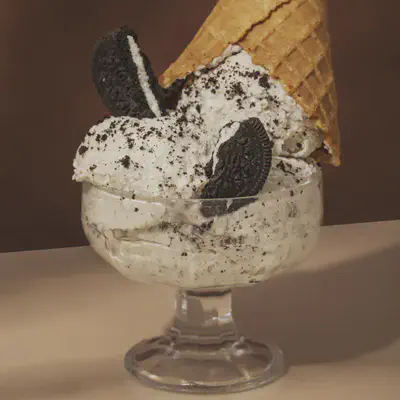Personality Disorders as Ice Cream Flavors
Personality disorders can be better understood using ice cream as an analogy. However, I must acknowledge my own bias, as I LOVE both ice cream and personality disorders! Whether you love or loathe either, your understanding of personality disorders will increase in a “flavorable” ;) manner after reading below!

So let’s dive into what the personality disorders are and if they were ice cream, what would they be? First, there are three categories, or “clusters,” in which personality disorders are organized. Cluster A contains three personality disorders characterized by “odd or eccentric” patterns (Paranoid, Schizoid, Schizotypal). Cluster B contains four personality disorders characterized by “dramatic, emotional, or erratic” patterns (Antisocial, Borderline, Histrionic, Narcissistic). Cluster C contains three personality disorders characterized by “anxious or fearful” patterns (Avoidant, Dependent, Obsessive-Compulsive).
CLUSTER A: Odd or eccentric patterns of personality
Paranoid Personality Disorder
DSM-5-TR Description: “Distrust and suspiciousness such that others’ motives are interpreted as malevolent.”
These patients are rarely seen in outpatient treatment, as there is an extremely high level of distrust and suspiciousness of others. They often have a pretty rigid perspective that everyone/the world is out to get them. They tend to believe (without evidence) that others wish them harm, are not loyal, will use information against them, and will attack them. Thus, they are unwilling to be vulnerable, quickly reacting with defensive anger and lashing out at others.
If they were an ice cream, they would be Catching Fire ice cream (Vanilla ice cream colored orange with orange juice, mango, a strawberry swirl, and a REAL scorpion on top). A lovely flavor, until you get to the scorpion. When fearful, the scorpion will defend itself by stinging, making it difficult to trust this ice cream type!
Schizotypal Personality Disorder
DSM-5-TR Description: “Acute discomfort in close relationships, cognitive or perceptual distortions, and eccentricities of behavior.”
These patients are less commonly seen in outpatient treatment due to lower needs for socialization and possible paranoia. They often present with inappropriate or constricted emotional expression, and they can have odd beliefs, thinking, speech, behavior, and appearance. Schizo- means “split,” and these individuals straddle the line between reality and fantasy. They may experience ideas of reference (falsely believing that random/irrelevant occurrences in the world directly relate to oneself), and/or magical thinking (belief that specific words, thoughts, emotions, or rituals can influence the world around them). They can also be socially anxious and suspicious of others, resulting in fewer relationships.
If they were an ice cream, they would be Orange Creamsicle. The dichotomy of vanilla and orange mirrors how they straddle the line between reality and unreality. They’re gentle souls that have distortions in thinking and reality, leading to eccentricity and oddness.
Schizoid Personality Disorder
DSM-5-TR Description: “Detachment from social relationships and a restricted range of emotional expression.”
These patients are less commonly seen in outpatient treatment due to detachment from social needs. They are relationally disconnected and can be emotionally cold, with little or no emotional expression. They tend to be indifferent to close relationships, praise or criticism, and pleasurable activities. Here the Schizo- “split” is between the individual and their needs, as well as the individual and the world.
If they were an ice cream, they would be Matcha Green Tea. They tend to withdraw to their own minds, disconnected from their own bodies and the social world. They’re a nonthreatening, subtle, yet odd flavor with no dramatics. They might be hard to find and equally just as likely to go unnoticed🐢.
CLUSTER B: Dramatic, emotional, or erratic patterns of personality.
Antisocial Personality Disorder
DSM-5-TR Description: “Disregard for, and violation of, the rights of others, criminality, impulsivity, and a failure to learn from experience.”
These patients are rarely seen in outpatient treatment (unless court-ordered) due to the inherent power imbalance between the client and therapist. Also, they likely think they don’t need help since they believe societal structures are ridiculous. They reject and move against social norms, including norms that are moral (e.g. lying, cheating, stealing), with no remorse. They can be impulsive, aggressive, irresponsible, and reckless. Interestingly, this diagnosis requires evidence of Conduct Disorder with onset before age 15.
If they were an ice cream, they would be Activated Charcoal, or a sorbet. They’re dark and violate boundaries, defying social norms/contracts. They reject being ice cream to begin with (so they become sorbet), or if they do accept being an ice cream flavor, it’s going to be dark, sinister, and black like charcoal.
Borderline Personality Disorder
DSM-5-TR Description: “Instability in interpersonal relationships, self-image, and affects, and marked impulsivity.”
These patients are very commonly seen in outpatient treatment because they tend to be intensely in touch with their pain and are motivated for help. Often embodying a “push-pull" dynamic, their relationships, self-image, and emotions are unstable. Struggling with impulsivity, they often feel empty, which can present as defensive anger, either toward others or themselves. They can experience paranoid ideation or severe dissociative symptoms when really stressed, but these symptoms are not long-lasting.
If they were an ice cream, they would be base flavors: Chocolate or Vanilla. They’re always hurting, so they’ll often show up to therapy. They can have different ingredients, and they’re not all the same, looking (and tasting) vastly different.
Histrionic Personality Disorder
DSM-5-TR Description: “Excessive emotionality and attention seeking.”
These patients are commonly seen in outpatient treatment because of the attention a therapist can provide to their excessive emotionality. Their emotions change quickly and are shallow, dramatic, theatrical, and exaggerated. They want to be the center of attention and are uncomfortable if they are not. Often using their appearance to elicit attention toward themselves, they can act in seductive and provocative manners, with speech that can be vague but excessively impressionistic. They tend to be suggestible and feel like their relationships are closer than they actually are.
If they were an ice cream, they would be Cotton Candy with Pop Rocks. They are colorful, explosive, dramatic, and attention grabbing. Having a superficial facade that is exaggerated and theatrical, if you look deeper, there is no substance behind it.
Narcissistic Personality Disorder
DSM-5-TR Description: “Grandiosity, need for admiration, and lack of empathy.”
These patients are rarely seen in outpatient treatment because they believe it is others who are the problem, not themselves. They desire to be recognized as superior, want excessive admiration, and are preoccupied with success, power, beauty, brilliance, etc. They believe they are special and thus have a sense of entitlement. They take advantage of others, lack empathy, tend to be arrogant, and are often envious of others.
If they were an ice cream, they would be Peppermint with Ghost Pepper pieces. A lovely, charming peppermint flavor at first bite, with grandiose ghost pepper tidbits that will burn and exploit you, unempathetically and unashamedly. You might even get a few charming and refreshing peppermint bites before realizing the pain of the ghost pepper that is about to come.
CLUSTER C: Anxious or fearful patterns of personality.
Avoidant Personality Disorder
DSM-5-TR Description: “Social inhibition, feelings of inadequacy, and hypersensitivity to negative evaluation.”
These patients are commonly seen in outpatient treatment, often with relational concerns (i.e. social anxiety), and especially when they have to be close with others. They view themselves as inferior, socially inept, and unappealing. They are very concerned with possible rejection or criticism in social situations because they feel inadequate. Because of this, they might avoid, limit themselves, or engage reluctantly in situations that could lead to criticism/rejection.
If they were an ice cream, they would be Cookies and Cream ice cream. They are the distance side of the borderline push-pull dynamic. They run from relationships to avoid the pain of being rejected. They have that vanilla base, but it’s a different kind of cookie. They are so fearful that they would rather not be close to others so they won’t get hurt.
Dependent Personality Disorder
DSM-5-TR Description: “Submissive and clinging behavior related to an excessive need to be taken care of.”
These patients are commonly seen in outpatient treatment, often with relational concerns, especially if they feel alone. They are indecisive, having low self-confidence and needing excessive reassurance. Fearful of self-sufficiency, they go to extreme means to get nurturance and support. Dependent individuals will avoid disagreeing with others due to fear that support or approval will be withdrawn. They have difficulty being alone and seek a new relationship as soon as one is terminated.
If they were an ice cream, they would be Cookie Dough. They are the “pull me closer” side of the borderline push-pull dynamic. The need for relationship, reassurance, and rescuing reminds me of a stereotypical movie breakup where the leading female intensely cries into the cookie dough ice cream in pain (a very acceptable coping mechanism, if I do say so myself)! They need to be in a relationship where the other person takes care of them.
Obsessive-compulsive Personality Disorder
DSM-5-TR Description: “Preoccupation with orderliness, perfectionism, and control.”
These patients are rarely seen in outpatient treatment because they don’t have time and are always “put together.” Therapy could be a threat to their control - a control that tightly contains their emotions. They need so much structure and perfectionism that it interferes with task completion. They are workaholics and reject leisure, as they are rigid, overconscientious, and stubborn. Having difficulty delegating because of their controlling nature, they also have problems discarding resources like money.
If they were an ice cream, they would be Coffee. They are the caffeinated energy that is required to pursue perfection and exactness. Their rigidity is so abundant that it spills out and splashes onto others as well. Excess energy is used to control their environment, values, ethics, and morality, so they need caffeinated ice cream to keep going (which is likely consumed after two to nine cups of actual coffee that day)☕.









